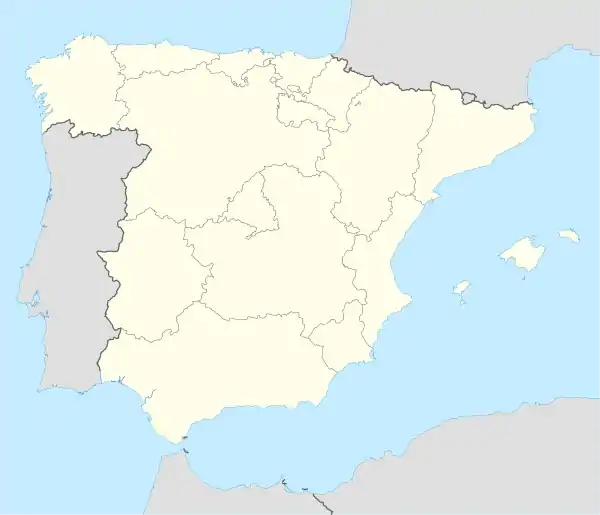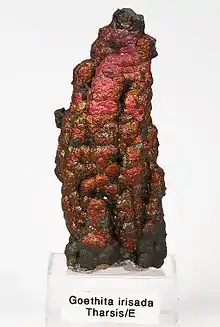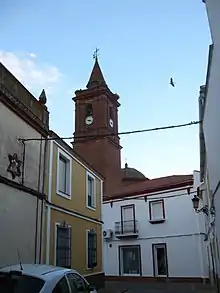Alosno
Alosno is a town and municipality located in the province of Huelva, Spain.[2] According to the 2013 census,[3] the village has a population of 1,840 inhabitants. The Filon Sur Mine, in Alosno municipality, is a notable source of fine specimens of the mineral goethite. Nearby is a 4500+ year old copper smelting archeological site named Cabezo Juré.[4]
Alosno | |
|---|---|
 Flag  Seal | |
 Alosno Location in Spain | |
| Coordinates: 37°32′55″N 7°06′55″W | |
| Country | Spain |
| Autonomous community | Andalusia |
| Province | Huelva |
| Comarca | Andévalo |
| Government | |
| • Mayor | Juan Manuel Orta Prieto |
| Area | |
| • Total | 193 km2 (75 sq mi) |
| • Land | 193 km2 (75 sq mi) |
| • Water | 0.00 km2 (0.00 sq mi) |
| Population (2018)[1] | |
| • Total | 3,942 |
| • Density | 20/km2 (53/sq mi) |
| Time zone | UTC+1 (CET) |
| • Summer (DST) | UTC+2 (CEST) |
| Postal code | 21520 |


The region is notable for production of fine ham, Jamon Serrano, through a system of pasturing and finishing on Holm oak's sweet acorns ( Bellotas ). The chorizo and local Manchego sheep cheeses are also outstanding. Much of the best land is also planted with green olives, for oil or for storage whole in brine. The town's style is very mediterranean with whitewashed walls and cobbles or concrete walks. Approximately 15 Bar/Grills and a number of more formal dinner restaurants line the main street in/out of town, with a main market and outdoor market also selling produce from stalls. Very low humidity makes up for the heat, and ocean moderating winds are common. Green countrysides start the year off with spring rains and progresses on to gold with the dry summers. Frost and snow are very rare.
Proximity to a prominent rock climbing face and centuries old nunnery and chapels.[5]
Alosno is "Cuna del Fandango" and is famous within Spain for flamenco players and festivals. Other important festivals are Cruces de Mayo, San Juan, Visperas, and many more.[6]
Notable people
The noted Spanish boxer Pedro Carrasco, and the fandango singer Paco Toronjo were born in Alosno.
Demographics
| Year | Pop. | ±% |
|---|---|---|
| 1999 | 4,843 | — |
| 2000 | 4,834 | −0.2% |
| 2001 | 4,792 | −0.9% |
| 2002 | 4,670 | −2.5% |
| 2003 | 4,514 | −3.3% |
| 2004 | 4,419 | −2.1% |
| 2005 | 4,514 | +2.1% |
| Source: [7] | ||
Villages
References
- Municipal Register of Spain 2018. National Statistics Institute.
- "Alosno - Sistema de Información Multiterritorial de Andalucía". Instituto de Estadística de Andalucía (in Spanish). Junta de Andalucía. 22 July 2005. Archived from the original on 17 December 2005. Retrieved 7 October 2019.
- Instituto Nacional de Estadística (INE)
- Sáez, Reinaldo; Nocete, Francisco; M. Nieto, José; Capitán, M. Ángeles; Rovira, Salvador (2003). "The Extractive Metallurgy of Copper from Cabezo Juré, Huelva, Spain: Chemical and Mineralogical Study of Slags Dated to the Third Millenium B.C.". The Canadian Mineralogist. 41 (3): 627–638. doi:10.2113/gscanmin.41.3.627. S2CID 44013182.
- "La Puebla se despide de su Romería de la Virgen de la Peña con el Sermón de Súplica y la procesión de los nuevos mayordomos". Huelva Buenas Noticias (in Spanish). Invergente SL. 2 May 2017. ISSN 2387-0885. Retrieved 7 October 2019.
- "Romería de San Antonio de Padua en Alosno". Agencia Andaluza de Instituciones Culturales (in Spanish). Consejería de Cultura y Patrimonio Histórico. Junta de Andalucía. Retrieved 7 October 2019.
- "Cifras oficiales de población resultantes de la revisión del Padrón municipal a 1 de enero". INE (in Spanish). Retrieved 7 October 2019.
External links
 Media related to Alosno at Wikimedia Commons
Media related to Alosno at Wikimedia Commons- Ayuntamiento de Alosno ( Town Leadership )